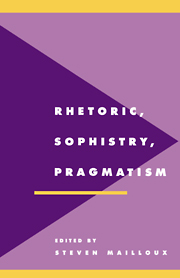Book contents
- Frontmatter
- Contents
- List of contributors
- Acknowledgements
- Introduction: sophistry and rhetorical pragmatism
- 1 Isocrates' philosophia and contemporary pragmatism
- 2 The degradation of rhetoric; or, dressing like a gentleman, speaking like a scholar
- 3 Antilogies, dialogics, and sophistic social psychology: Michael Billig's reinvention of Bakhtin from Protagorean rhetoric
- 4 The “genealogies” of pragmatism
- 5 Philosophy in the “new” rhetoric, rhetoric in the “new” philosophy
- 6 Individual feeling and universal validity
- 7 Pragmatism, rhetoric, and The American Scene
- 8 The political consequences of pragmatism; or, cultural pragmatics for a cybernetic revolution
- 9 In excess: radical extensions of neopragmatism
- Selected bibliographies
- Index
6 - Individual feeling and universal validity
Published online by Cambridge University Press: 03 December 2009
- Frontmatter
- Contents
- List of contributors
- Acknowledgements
- Introduction: sophistry and rhetorical pragmatism
- 1 Isocrates' philosophia and contemporary pragmatism
- 2 The degradation of rhetoric; or, dressing like a gentleman, speaking like a scholar
- 3 Antilogies, dialogics, and sophistic social psychology: Michael Billig's reinvention of Bakhtin from Protagorean rhetoric
- 4 The “genealogies” of pragmatism
- 5 Philosophy in the “new” rhetoric, rhetoric in the “new” philosophy
- 6 Individual feeling and universal validity
- 7 Pragmatism, rhetoric, and The American Scene
- 8 The political consequences of pragmatism; or, cultural pragmatics for a cybernetic revolution
- 9 In excess: radical extensions of neopragmatism
- Selected bibliographies
- Index
Summary
“We have the issue clearly set before us: Feeling valid only for the individual is pitted against reason valid universally.”
Making experience come alive through astute insight is not as valued in Anglo-American philosophy as is categorization, differentiation, and logical clarification. William James asked plaintively in a book that was only published posthumously (1911), whether it was better to live or to understand life. Although he answered that “we must do both alternately, and a man can no more limit himself to either than a pair of scissors can cut with a single one of its blades,” he exhibited somewhat more ambivalence in his own writings. Communicating the concreteness of lived experience has all too often these days been relegated to poetic or literary genres while philosophers claim expertise only in evaluating the validity of rational argumentation. Granted, it has always been the business of philosophers to make us aware of the limits of analysis and – by implication, at least – of the importance of mimetic education, myths, poetry, and music. But if reflective analysis is too narrowly restricted to formal argumentation alone, it risks slipping into the sterility of pursuing mental games disconnected from the actual situations in which we find ourselves.
Pragmatism, existentialism, and feminism, however, have refused this restriction to abstract and formal analysis. Some feminists argue from the situatedness of the body and others from the historical specificity of marginality or victimization within a patriarchally ordered society.
- Type
- Chapter
- Information
- Rhetoric, Sophistry, Pragmatism , pp. 139 - 154Publisher: Cambridge University PressPrint publication year: 1995



